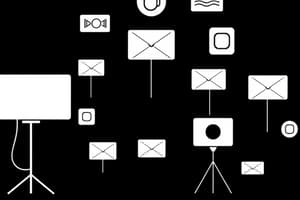Podcast
Questions and Answers
Which of the following is NOT a benefit of using clinical measurement in stuttering assessment and treatment?
Which of the following is NOT a benefit of using clinical measurement in stuttering assessment and treatment?
- Documenting improvements and hours of funded treatment required
- Establishing a common language between clinicians and clients
- Monitoring post-treatment progress
- Reducing the need for treatment goals (correct)
What is the purpose of telehealth assessments in stuttering assessment and treatment?
What is the purpose of telehealth assessments in stuttering assessment and treatment?
- To provide a more accurate assessment than in-clinic assessments
- To reduce client satisfaction with the assessment process
- To provide comparable results to in-clinic assessments (correct)
- To save time for clinicians by not requiring in-clinic assessments
Why is it necessary for clinicians to use clinical measurement to keep track of day-to-day variations in stuttering severity?
Why is it necessary for clinicians to use clinical measurement to keep track of day-to-day variations in stuttering severity?
- Stuttering severity is not important to track
- Stuttering severity is variable and changes across everyday situations (correct)
- Stuttering severity only changes during treatment sessions
- Stuttering severity is constant and does not change over time
Flashcards are hidden until you start studying
Study Notes
The Importance of Clinical Measurement in Stuttering Assessment and Treatment
- Clinical measurement helps quantify the impact of stuttering on clients, both behaviorally and non-behaviorally.
- Reference texts provide an overview of formal clinical assessments for stuttering adults and children.
- Telehealth assessments have been found to be comparable to in-clinic assessments in terms of time, results, and client satisfaction.
- Clinical measures establish a common language between clinicians and clients to communicate about stuttering severity and treatment progress.
- Stuttering treatments require clear treatment goals, which can be conveyed to clients using clinical measurements.
- Clinical measurement is essential for treatment accountability and documenting improvements and hours of funded treatment required.
- Progress towards treatment goals needs to be assessed and documented using clinical measures.
- Clinical measurement can assist in exploring and fixing treatment progress issues.
- Maintenance of treatment gains is crucial, and clinical measurement can be used to monitor post-treatment progress and prevent relapse.
- Stuttering severity is variable and changes across everyday situations, making it necessary for clinicians to use clinical measurement to keep track of day-to-day variations.
- Clinicians may ask clients to measure stuttering severity in daily situations to explore whether systematic improvement is occurring.
- Clinical measurement is an indispensable tool in stuttering assessment and treatment, providing quantifiable data to inform treatment decisions and track progress.
Studying That Suits You
Use AI to generate personalized quizzes and flashcards to suit your learning preferences.




